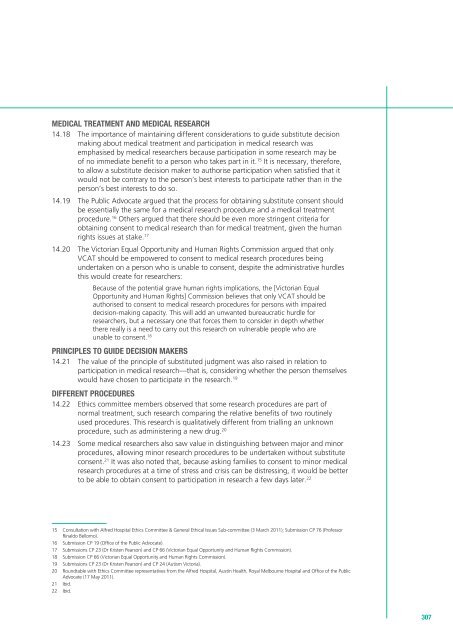Medical research - Victorian Law Reform Commission
Medical research - Victorian Law Reform Commission
Medical research - Victorian Law Reform Commission
You also want an ePaper? Increase the reach of your titles
YUMPU automatically turns print PDFs into web optimized ePapers that Google loves.
<strong>Medical</strong> treatment and medical <strong>research</strong><br />
14.18 The importance of maintaining different considerations to guide substitute decision<br />
making about medical treatment and participation in medical <strong>research</strong> was<br />
emphasised by medical <strong>research</strong>ers because participation in some <strong>research</strong> may be<br />
of no immediate benefit to a person who takes part in it. 15 It is necessary, therefore,<br />
to allow a substitute decision maker to authorise participation when satisfied that it<br />
would not be contrary to the person’s best interests to participate rather than in the<br />
person’s best interests to do so.<br />
14.19 The Public Advocate argued that the process for obtaining substitute consent should<br />
be essentially the same for a medical <strong>research</strong> procedure and a medical treatment<br />
procedure. 16 Others argued that there should be even more stringent criteria for<br />
obtaining consent to medical <strong>research</strong> than for medical treatment, given the human<br />
rights issues at stake. 17<br />
14.20 The <strong>Victorian</strong> Equal Opportunity and Human Rights <strong>Commission</strong> argued that only<br />
VCAT should be empowered to consent to medical <strong>research</strong> procedures being<br />
undertaken on a person who is unable to consent, despite the administrative hurdles<br />
this would create for <strong>research</strong>ers:<br />
Because of the potential grave human rights implications, the [<strong>Victorian</strong> Equal<br />
Opportunity and Human Rights] <strong>Commission</strong> believes that only VCAT should be<br />
authorised to consent to medical <strong>research</strong> procedures for persons with impaired<br />
decision-making capacity. This will add an unwanted bureaucratic hurdle for<br />
<strong>research</strong>ers, but a necessary one that forces them to consider in depth whether<br />
there really is a need to carry out this <strong>research</strong> on vulnerable people who are<br />
unable to consent. 18<br />
Principles to guide decision makers<br />
14.21 The value of the principle of substituted judgment was also raised in relation to<br />
participation in medical <strong>research</strong>—that is, considering whether the person themselves<br />
would have chosen to participate in the <strong>research</strong>. 19<br />
Different procedures<br />
14.22 Ethics committee members observed that some <strong>research</strong> procedures are part of<br />
normal treatment, such <strong>research</strong> comparing the relative benefits of two routinely<br />
used procedures. This <strong>research</strong> is qualitatively different from trialling an unknown<br />
procedure, such as administering a new drug. 20<br />
14.23 Some medical <strong>research</strong>ers also saw value in distinguishing between major and minor<br />
procedures, allowing minor <strong>research</strong> procedures to be undertaken without substitute<br />
consent. 21 It was also noted that, because asking families to consent to minor medical<br />
<strong>research</strong> procedures at a time of stress and crisis can be distressing, it would be better<br />
to be able to obtain consent to participation in <strong>research</strong> a few days later. 22<br />
15 Consultation with Alfred Hospital Ethics Committee & General Ethical Issues Sub-committee (3 March 2011); Submission CP 76 (Professor<br />
Rinaldo Bellomo).<br />
16 Submission CP 19 (Office of the Public Advocate).<br />
17 Submissions CP 23 (Dr Kristen Pearson) and CP 66 (<strong>Victorian</strong> Equal Opportunity and Human Rights <strong>Commission</strong>).<br />
18 Submission CP 66 (<strong>Victorian</strong> Equal Opportunity and Human Rights <strong>Commission</strong>).<br />
19 Submissions CP 23 (Dr Kristen Pearson) and CP 24 (Autism Victoria).<br />
20 Roundtable with Ethics Committee representatives from the Alfred Hospital, Austin Health, Royal Melbourne Hospital and Office of the Public<br />
Advocate (17 May 2011).<br />
21 Ibid.<br />
22 Ibid.<br />
307
















